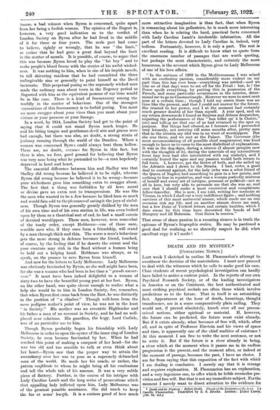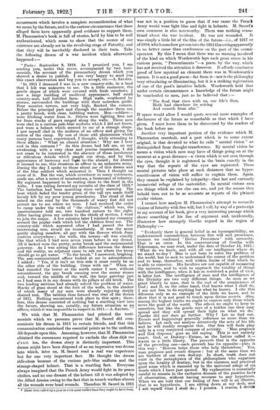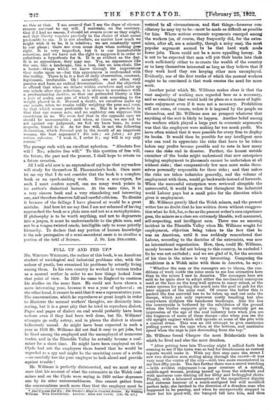DEATH AND ITS MYSTERY.* [CONCLUDING NOTICE.]
Lan week I sketched in outline M. Flammarion's attempt to overthrow the doctrine of the materialists. I must now proceed to deal with the witnesses which he calls to make good his case. Close students of recent psychological investigation can hardly have failed to notice a curious point. In the reports of our own Psychical Research Society, or of the leading investigators in America or on the Continent, the best authenticated and most striking psychical recitals are often those which involve predictions as to the future. That in itself is an astonishing fact. Appearances at the hour of death, hauntings, thought transference, are in a sense comparatively plain sailing. They would not, if proved absolutely, knock over all our precon- ceived notions, either spiritual or material. If, however, the future can he predicted, the future must exist already. But if it exists already, what becomes of free will, which, after all, and in spite of Professor Einstein and his views of space and time, is apparently one of the chief realities of existence ? At this moment I am free to write the next sentence, or not to write it. But if the future is a river already in being, a river which at the moment when it passes me in its endless progression is the present, and the moment after, or indeed at the moment of passage, becomes the past, I have no choice. I am far from saying that this exposition of the fact with which I am dealing is conclusive. I merely say that it is strange and requires explanation. M. Flammarion has an explanation, and a very ingenious one, to offer which he holds reconciles pre. vision and free will. But that is not my immediate subject. Forths moment I merely want to direct attention to the evidence for • Death and its Mystery : Before Death. Proofs of the Existence of tZe Sit!. 1$ Camille Flamraarion. Translated by E. 8, Brooks. London : Fieher
• itos. ad. net.]
occurrences which involve a complete reconsideration of what we mean by the future, and to the curious circumstance that these alleged facts have apparently good evidence to support them. M. Flammarion's book is full of stories, hekl by him to be well authenticated, which seem to show that the scenes of our existence are already set in the revolving stage of Futurity, and that they will be inevitably disclosed in their turn. Take the following dream of a war incident which afterwards happened :— " Paris : September 9, 1919. As I promised you, I am sending you, under this cover, accompanied by two testi- monials, the account of the premonitory dream which you showed a desire to publish. I am very happy to send you this exact observation and beg you to accept, etc.—A. SAUREL.
'In 1911 I dreamed I was in a new country-side, in a land that I felt was unknown to me. On a little eminence, the gentle slopes of which were covered with fresh meadows, I saw a large building of medieval appearance, half small country-seat, half fortified farm. High walls, weathered by storms, surrounded the buildings with their unbroken girdle. Four massive towers, not very high, flanked the corners. Before the principal part and through the meadow there ran a pretty brook, with clear, babbling waters. Men—soldiers- were fetching water from it. Others were lighting fires not far from stacks of guns ranged along the walls. These men were clad in a curious pale-blue uniform which I did not know, and wore a helmet which seemed to me of a strange shape. I saw myself clad in the uniform of an officer and giving the orders of the camp. By one of those odd phenomena which many persons have experienced, I thought, while attending to these affairs : "What an absurd situation ! Why am I here and in this costume?" As this dream had left me, on my awakening, with a very clear and precise impression, I did not cease to be interested in the absence of those incoherent or ridiculous details which people our sleep, and by this appearance of harmony and logic in•the absurd ; for absurd it seemed to me, this situation as officer in an unknown army. During the day I spoke to those about me of this dream and of the blue soldiers which animated it. Then I thought no more of it. But the war, which overthrew so many existences, made me, after a series of incarnations, a lieutenant of infantry. My regiment happened to be resting close to the front in the Aube. I was taking forward my recruits of the class of 1919.* The battalion had been marching since early morning. Thb heat which faded the tender green of the tall rye made itself keenly felt by my poor young greenhorns. The cloud of dust raised on the road by the thousands of weary feet did not permit me to see where we wore. I had received the order to camp under the walls of "the château," which was, the quartermaster told me, two hundred meters to the right After having given my orders to the chiefs of section, I went to join the major. A few minutes later I rejoined my company around the poplar walk which hid the château from me. The country-side which appeared after I had passed the last intervening tree, struck me immediately. It was the same gently sloping meadow, all gay with the flowers which June scatters everywhere ; the walls, the towers—all was exactly like that which I had seen seven years before in my dream. All it lacked were the pretty, noisy brook and the monumental gateway. As I was noting this difference between the dream and the reality, an adjutant came to ask me where the troop should go to get water. "To the brook," I answered, laughing. The non-commissioned officer looked at me in astonishment. I added : "Yea, if it isn't on this side it must surely be on the other side of the building. Come with me." When we had rounded the tower at the north corner I saw, without astonishment, the gay brook running over the mossy stones and, toward the middle of the wall, the large gateway just as I had seen it in my dream with its pillars of old brick. The two leading sections had already solved the problem of water. Stacks of guns stood at the foot of the walls, in the shadow of which many of my men were already enjoying deeply desired rest. The tableau thus formed was that of the dream of 1911. Nothing sensational took place in this spot ; there- fore, this dream consisted of nothing but a startling view into the future, showing me, notably, my future situation as an officer, which it was impossible to suspect in 1911.—A. SAUREL.' " We wish that M. Flammarion had printed the testi- monials which we presume prove that M. Saurel did com- municate his dream in 1911 to certain friends, and that this communication contained the essential points as to the uniform. All depends upon this. Assuming, however, that M. Flammarion obtained the assurances required to exclude the chose déjà rue ela at ion, the dream story is distinctly important. This dream might have been disposed of as an impressive war dream into which, later on, M. Saurel read a real war experience but for one very important fact. He thought the dream ridiculous because of the curious pale-blue uniform and the strange-shaped helmet. That is a startling fact. Everyone always imagined that the French Army would fight in its peace clothes, and no one dreamt of the helmet till it was adopted by the Allied Armies owing to the fact that in trench warfare almost all the wounds were head wounds. Therefore M. Saurel in 1911
• These were called up a year or even wore earlier than they ought to have been.
was not in a position to guess that if war came the Frenck Army would wear light blue and fight in helmets. M. Sauter* own comment is also noteworthy. There was nothing sensa- tional about the war incident. Ho was not wounded. It was simply a little bit of the film of the future—i.e., of 1917 or of 1918, which somehow got run into the 1911 film owingapparently to no better cause than carelessness on the part of the cosmic operator. By this I mean that there was no warning involved of the kind on which Wordsworth lays such great stress in his curious poem, "Presentiments "—a poem, by the way, which has not received the attention it deserves. It affords conclusive proof of how mystical an element there was in Wordsworth's nature. It is not a good poem—far from it—nor is the philosophy very stimulating or illuminating, but it is a striking registration of one of the poet's intuitive beliefs. Wordsworth held that under certain circumstances a knowledge of the future might be vouchsafed to men, just as he believed that :— " The Soul that rises with us, our life's Star, Rath had elsewhere its setting And cometh from afar."
If space would allow I would quote several more examples of disclosures of the future as remarkable as that which I have given. I must leave them to be discovered by the readers of the book before me.
Another very important portion of the evidence which M. Flammarion marshals, and a part which is to some extent original, is that devoted to what he calls "mental vision" as distinguished from thought-transference. By mental vision he means a vision which men may have of things going on at the moment at a great distance—a vision which is not seen through the eyes, thought it is registered in the brain exactly in the way that the reports of the eyes are registered. These mental pictures take plate at such distances that no hyper- sensitiveness of vision will suffice to explain them. Again, they cannot be explained by telepathy—that last and curiously immaterial refuge of the materialist. In mental visions men see things which no one else can see, and yet the scenes they behold turn out to be as accurate as reports of the plainest ocular visions.
I cannot here analyse M. Flammarion's attempt to reconcile visions of futurity with free will, but I will, by way of a postscript to my account of his book, give a very interesting passage which shows something of his line of argument and, incidentally, illustrates how strangely Goethe argued in the region of Philosophy :— "Evidently there is general belief in an incompatibility, an undetermined contradiction between free will and prescience, because we confound Divine Prescience' with necessity. That is an error. In the conversations of Goethe with Eckermann, we may read, under the date of October 13, 1825: What do we know, and with all our intelligence where do we stand to-day Man is not born to solve the problem of the world, but to seek to understand the extent of the problem and to keep, thereafter, well within limits of that which he is able to conceive. His faculties are not capable of measuring the universe, and to wish to approach the totality of things with the intelligence, when it has so restricted a point of view, is labor lost. The intelligence of man and the intelligence of the Divinity are two very different things. As soon as we grant liberty to man, that is the end of the omniscience of God ; and if, on the other hand, God knows what I shall do, I am not free to do anything but what he knows. I cite this dilemma only as an example of the little we know, and to show that it is not good to touch upon divine secrets. Also, among the highest truths we ought to express only those which serve the good of the world. The others we ought to keep to ourselves, but like the gentle rays of a hidden sun they may spread and they will spread their light on what we do.' Goethe did not dare go further. Why ? Let us find out. Events and happenings generally influence us more than we believe. Let each one analyze attentively the acts of his life and he will readily recognize this. Our free will finds play only in a very restricted compass of activity. Man proposes and God disposes,' goes an old saying. This is not entirely exact. God, or Destiny—Faturn, as the Latins called it— leaves us a little liberty. The proverb that is the opposite of the preceding one—each proverb has its opposite—puts it this way : Heaven helps those who help themselves. Yes, man proposes and events dispose : but at the same time we are builders of our own destiny. In short, truth does not exist in the metaphysics of the. philosophers who expatiate upon the fatality of destiny, but m the common and practical good sense which is summed up in the universal adage of six words which I have just quoted. My explanation is essentially careful to remain in the exclusive domain of the positive facts of observation, without having recourse to any hypothesis. When we are told that our feeling of free will is an illusion, that is an hypothesis. I am sitting down at my desk, and I ask myself what I shall do ; I ponder. I reason, I decide on this or 'that. II am assured that am the-dupe-of eircum-- stances external to my will. ./ maintain, - on the 'contrary, that if .1-had no-mason, aehonld-let -events occur-as they might, and that liberty consists precisely in the choice of what seems, preferable to me. It is not absolute, no -matter how much we might wish -it to 'be, it -is relative.; we are constantly upset; in our plans.; -them are oven some days when nothing goes' right. 'It is very imperfect, but it is our incontestable sensation, and we have not the right to suppress it in order to substitute a hypothesis for it. It is as evident -as the day. tIt is an appearance, they may say.' Yes an appearance like . the sun, like a landscape, like -a tree, like an arra-chain 'like a house—things which, we -know through the inapressionz they make upon us—but 'this appearance is confounded with the 'reality. 'Them is in itaa lea of daily observation, constant, legitimate, irrefutable. Oh! assuredly, we are often veri- pasaive and form no radical determination. And the objection is offered that when we debate within ourselves and make up our minds after ripe reflection, it is always in accordance with .predominating motive, so that our 'pretended liberty is like a pair of scales, one pan of which will sink according to the weight placed in it. Beyond a doubt, we ourselves make up our minds, when -we reason coldly weighing the pros -and cons, to that which seems preferable to us. But it is 'precisely in that that our reason acts, and no sophistry -can suppress this conviction in us. -We even feel that in the • opposite ease we should be unreasonable ; and When, at times, we are led to act against our 'judgment, we feel we have 'been in some respects, 'forced to it. As for free .will, Is not the following declaration, which Juvenal put in the mouth of an imperious woman, the best argument ? Sic solo ; sic jubeo ; -sit pro ratione voluntas. 'I wish it, I order It; my will is my only reason.'" The passage ends -with 'an excellent 'aphorism. Absolute 'free will ? ; relative free Will." 'To -this queetion all free the future, -the past -and- the 'present, I -Shall hope 'to return on a future • occasion.
All I will add -now is an expressional my hope that anyreaders will study for themselves -151. Flammarion'a book. Once more let me say that I do mot consider that the book le -a complete book or an epoch-making work. 'Even -a non-expert, for such I must confess myself, can -see many weak points in is author's • dialectical harness. At the same time, it is a very sincere book and a very stimulating -and interesting one, and therefore deserves fulland•carefelcriticism. 'To dismiss it because of the failings I have glanced at would be a -great mistake. And herelet me say that Tam not ashamed' of having approached the book as a plain man-and not asaanattaphysician. If philosophy is to be worth anything, 'and not to degenerate into a jargon, it must be understandable-to the plain .man, and not heaa tongue-twisted oracle,' intelligible only to-some-priestly hierarchy. To declare that any portion of hunfan ininviledge is the sole :preregativeTif a semi-sacerdotal caste is to sterilize a portion of the field of Science. J. Sr. In 'STRAelatri.




































 Previous page
Previous page